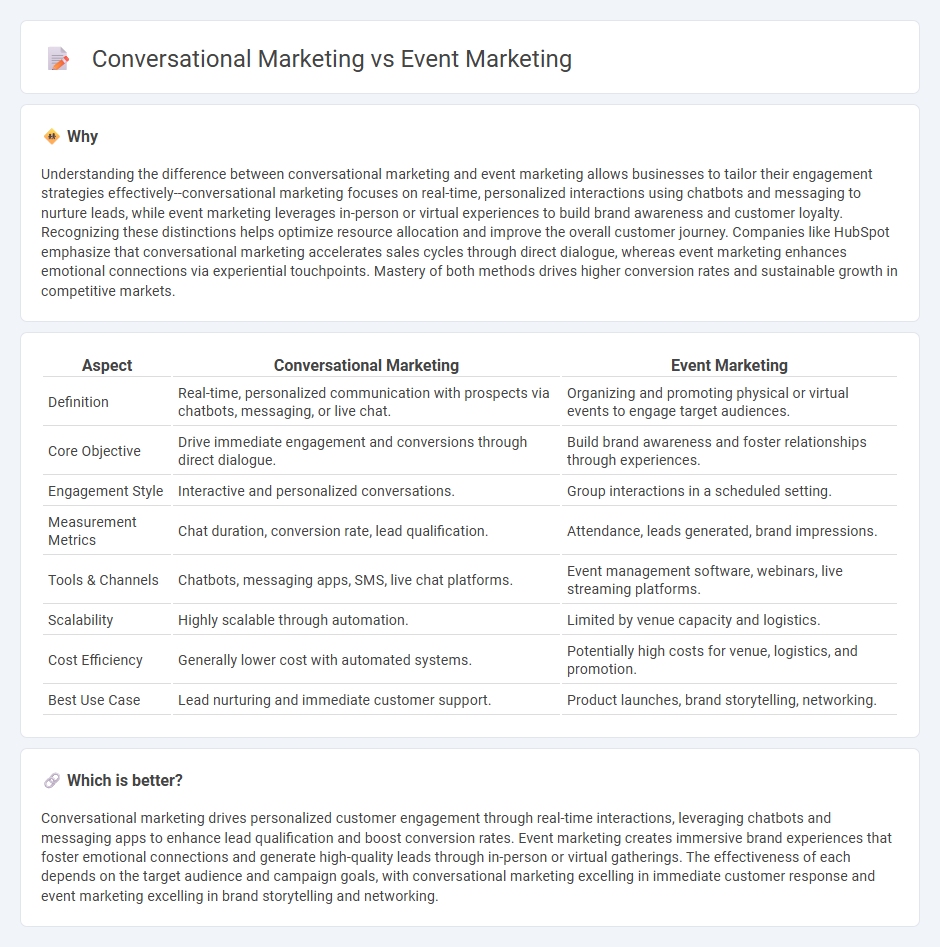
Conversational marketing leverages real-time, personalized interactions through chatbots and messaging apps to engage customers and drive immediate responses. Event marketing focuses on creating immersive experiences through live or virtual events to build brand awareness and foster deeper connections. Discover how these strategies can transform your customer engagement and ROI.
Why it is important
Understanding the difference between conversational marketing and event marketing allows businesses to tailor their engagement strategies effectively--conversational marketing focuses on real-time, personalized interactions using chatbots and messaging to nurture leads, while event marketing leverages in-person or virtual experiences to build brand awareness and customer loyalty. Recognizing these distinctions helps optimize resource allocation and improve the overall customer journey. Companies like HubSpot emphasize that conversational marketing accelerates sales cycles through direct dialogue, whereas event marketing enhances emotional connections via experiential touchpoints. Mastery of both methods drives higher conversion rates and sustainable growth in competitive markets.
Comparison Table
| Aspect | Conversational Marketing | Event Marketing |
|---|---|---|
| Definition | Real-time, personalized communication with prospects via chatbots, messaging, or live chat. | Organizing and promoting physical or virtual events to engage target audiences. |
| Core Objective | Drive immediate engagement and conversions through direct dialogue. | Build brand awareness and foster relationships through experiences. |
| Engagement Style | Interactive and personalized conversations. | Group interactions in a scheduled setting. |
| Measurement Metrics | Chat duration, conversion rate, lead qualification. | Attendance, leads generated, brand impressions. |
| Tools & Channels | Chatbots, messaging apps, SMS, live chat platforms. | Event management software, webinars, live streaming platforms. |
| Scalability | Highly scalable through automation. | Limited by venue capacity and logistics. |
| Cost Efficiency | Generally lower cost with automated systems. | Potentially high costs for venue, logistics, and promotion. |
| Best Use Case | Lead nurturing and immediate customer support. | Product launches, brand storytelling, networking. |
Which is better?
Conversational marketing drives personalized customer engagement through real-time interactions, leveraging chatbots and messaging apps to enhance lead qualification and boost conversion rates. Event marketing creates immersive brand experiences that foster emotional connections and generate high-quality leads through in-person or virtual gatherings. The effectiveness of each depends on the target audience and campaign goals, with conversational marketing excelling in immediate customer response and event marketing excelling in brand storytelling and networking.
Connection
Conversational marketing enhances event marketing by facilitating real-time, personalized interactions with attendees through chatbots and live messaging, boosting engagement and lead generation at events. Event marketing creates immersive experiences that provide rich conversational data, enabling marketers to tailor follow-up communications more effectively. Integrating conversational marketing into event strategies optimizes customer journeys by combining human-like dialogue with live physical or virtual event experiences.
Key Terms
Event marketing:
Event marketing leverages in-person or virtual experiences to engage audiences, boost brand awareness, and generate leads through immersive, memorable interactions. Key formats include trade shows, product launches, webinars, and experiential activations, which drive high attendee engagement and measurable ROI. Discover more strategies and benefits of effective event marketing to elevate your brand presence.
Experiential
Experiential marketing creates immersive brand experiences through live events, engaging audiences by appealing to their senses and emotions. Conversational marketing leverages real-time, personalized interactions via chatbots, social media, or messaging platforms to foster direct dialogue and enhance customer relationships. Explore the unique benefits of each strategy to optimize your marketing approach.
Sponsorship
Sponsorship in event marketing involves brands partnering with events to enhance visibility and engage live audiences through direct experiences and branded content. In contrast, conversational marketing leverages sponsored chatbots and personalized messaging to create interactive customer interactions that drive real-time engagement and lead generation. Explore how integrating sponsorship strategies in both marketing approaches can amplify brand impact and ROI.
Source and External Links
What is Event Marketing: Key Concepts, Proven Strategies ... - Eventtia - Event marketing is a strategic approach that connects brands with their audience through interactive events like conferences, seminars, or workshops to create memorable experiences that build trust, educate customers, and generate excitement around products or services.
What is Event Marketing? Definition, Benefits, and... | ActiveCampaign - Event marketing involves planning and executing events to promote products, services, or brands, offering benefits such as lead generation, brand awareness, customer engagement, and community building through in-person, virtual, or hybrid events like product launches, trade shows, and experiential marketing.
Event Marketing: Strategy Guide + Tips - Adobe Experience Cloud - Effective event marketing campaigns combine remarketing, content creation, and social media strategies to promote events, increase attendance, and maximize brand exposure through targeted ads, engaging blog posts, and interactive social media posts.
 dowidth.com
dowidth.com